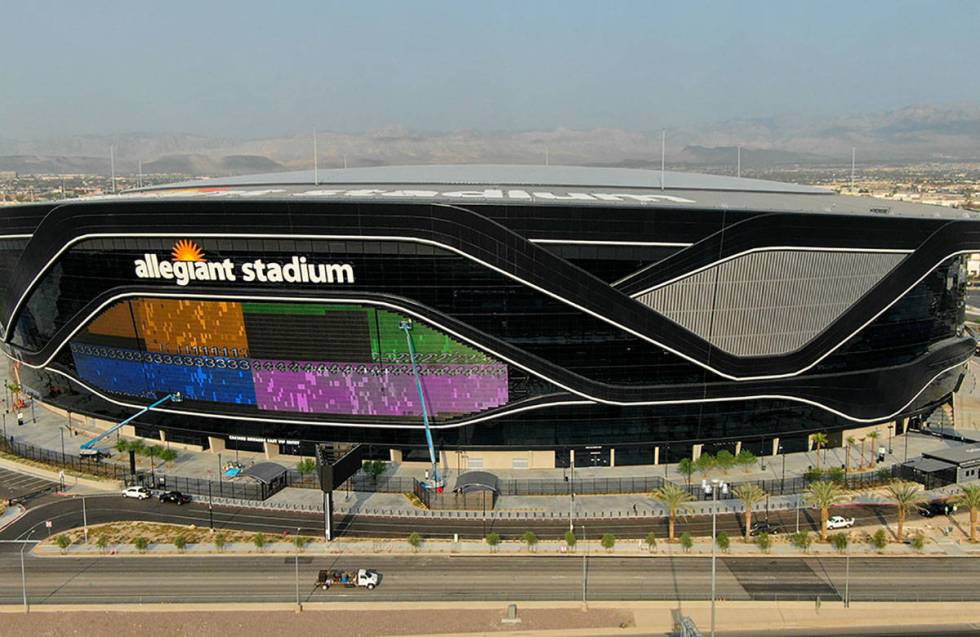Breaking down Allegiant Stadium’s bonds and debt reserve

Despite having to pull money out of a rainy day fund to make a scheduled bond payment on Allegiant Stadium, officials aren’t worried the fund will go dry.
Because of a shortfall in room tax revenue, Clark County withdrew $11.55 million from a debt reserve fund to make Tuesday’s scheduled $16.06 million bond payment. Allegiant Stadium and the land it sits on are owned by the Las Vegas Stadium Authority, after being transferred ownership by the Raiders, with the county handling the bond process.
Despite that, Moody’s Investors Service said in a report this week that Clark County’s credit rating remains unaffected and the reserve account sufficient even if the room tax revenue continues to lag expectations.
“The reserve account remains substantial and can support continued draws to make debt payments for several years if visitor volumes remain depressed because of the coronavirus pandemic,” Moody’s report stated. “Our rating of the bonds (Aa1 stable) is based on the county’s GOLT (general obligation limited tax) pledge and not the hotel room tax or the reserve fund.”
The debt reserve fund was set up exactly for these circumstances — to handle a shortfall in room tax revenue, which is generated by a 0.88 percent room tax on Clark County hotels. With the pandemic reducing visitation to Las Vegas, the tax has collected less revenue to pay the public contribution to the $2 billion stadium.
Here’s a look at the bonds and the debt reserve, according to Clark County and the Las Vegas Stadium Authority.
When was the bond sale?
In April 2018 the county sold $645 million in bonds in 90 minutes to go toward the $750 million total public contribution, with the balance accounted for in room tax revenue before the bond sale.
The 30-year bonds carry an interest rate of 3.94 percent and have a maturity date of 2048.
When are bond interest payments due?
Bond interest payments are made every six months, at the start of June and the beginning of December.
Tuesday’s payment was $16.06 million. The scheduled June 1 payment is $18.06 million, which includes a principal amount of $2.55 million.
The amount of the annual payment will increase gradually each year with the total peaking in the final year of the bond term — 2048 — when the bond payment will be $59.16 million.
What is the debt reserve account?
The debt reserve was set up to be able to cover two full years of bond payments — $90.2 million — in the event there is a room tax revenue deficit, as there is currently amid the COVID-19 pandemic.
Funds for the debt reserve are derived from room tax revenue after the annual debt service on the bonds is paid. Up to $9 million can be deposited into the reserve each year until the two-year cap is met.
In fiscal year 2018, $352,000 in excess revenue was generated for the reserve fund account, with $9 million sent to the reserve fund in FY 2019.
Fiscal year 2020, which ended June 30, is still being audited.
After the withdrawal for Tuesday’s payment there is $57.3 million remaining. Any withdrawals from the reserve fund must be repaid in future years from available room tax.
How has the pandemic affected room tax revenue?
The COVID-19 pandemic has already impacted room tax collections in Clark County as visitor volume has been hit hard in Las Vegas.
Moody’s report noted room tax collections were insufficient to cover debt service for the Dec. 1 interest payment as visitor volume was down 54.2 percent this year through October.
Through September, the room tax has generated $3.99 million for fiscal year 2021, which began July 1. That is down 68 percent from the $12.35 millon collected during the same stretch last year, according to stadium authority data.
Contact Mick Akers at makers@reviewjournal.com or 702-387-2920. Follow @mickakers on Twitter.